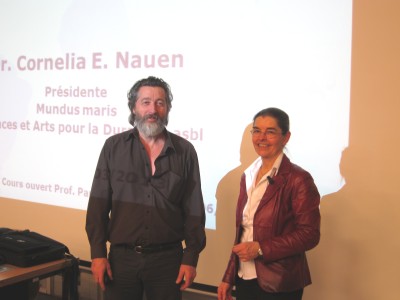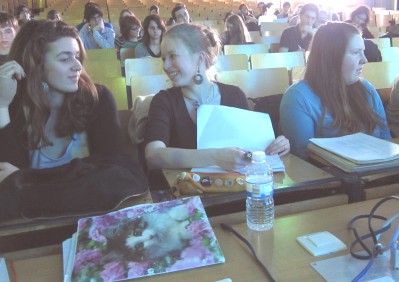Open course "Interaction land - sea"
 The open course of Prof. Paul Jacobs "Interaction land - sea" was for second year students.
The open course of Prof. Paul Jacobs "Interaction land - sea" was for second year students.
Paul Jacobs introduced the topic and the speaker. The talk was structured in four parts:
- The land and the oceans - the basics
- Did you know (with more infos on the interactions)
- What are the implications of these facts?
- What can we do together?
The presentation gave some foundation data about basic distribution of land and seas as well as key interactions between them in coastal zones.
The second part discussed what the oceans and the land mean to us in terms of food, shelter, energy, communication, climate conditions and much more.
Part 3 discussed major threats to the oceans, namely in the form of overfishing, climate change and plastic pollution. These threats are closely intertwined with the way we use the land. This can be seen in the form of agricultural runoff leading to eutrophication of coastal zones, loss of top soil from unsustainable land use practices.
These do not only reduce agricultural productivity but can lead, among others, to public health problems, when sandstorms become more frequent and provoke respiratory difficulties. Climate change affects marine as well as terrestrial organism with observable poleward movements as tropical and subtropical zones become too warm for their survival. Marine pollution, notably plastic litter, is very largely the result of improper landfills and other poor practices.
When the plastic disintegrates into smaller and smaller fragments throughout the water column in the oceans and is ingested by marine organisms, they may starve to death. This is already leading to collapse of marine bird populations. Moreover, it may well come to haunt us as we may have marine organisms intoxicated by plastics and other undesirable molecules when we have them on our menu.
 The last part of the talk focused on citizen action to protect the oceans and promote sustainable land use practices, underlining the importance of good science and citizen engagement.
The last part of the talk focused on citizen action to protect the oceans and promote sustainable land use practices, underlining the importance of good science and citizen engagement.
Increasing the scale and scope of protected areas on the land and in the seas is showing results, whenever implemented properly. Protected areas are considered by ecologists and resource economists alike as an insurance policy for coping with change. They help to protect the integrity of marine and land ecosystems and the functioning of life-support system Earth.
Protecting more space from direct human exploitation is in line with international agreements and recommendations, e.g. those adopted by the Parties to the Convention on Biological Diversity (CBD). However, this and other international decisions are not yet implemented as agreed. To achieve better implementation and enforcement of existing laws, regulations and international agreements citizen action and international cooperation are essential.
Some examples of recent work by Mundus maris to promote sustainability education and practice were also given to underscore the feasibility and desirability of critical thinking and civic engagement. Critical thinking is all the more important as many issues are framed only from one dominant perspective and may not address the problems accurately. By way of example we note the widespread political preference for industrial forms of food production, whether in the sea or on the land. This is also reflected in what national and international statistics and accounting systems document.
The on-going reconstruction of more realistic fisheries production data, country by country, by the Sea Around Us Project challenges this distorted perspective. The reconstructions bring to light that so called "small-scale fisheries" are much more important than can be understood from official records, which may thus support wrong analyses and decisions. Artisanal fisheries also have several other positive characteristics over industrial fisheries, such as greater energy efficiency per unit of production and social effects. Early indications suggest that small-scale producers of food on the land may also be more important than official statistics make believe.
Click here for the powerpoint of the open course.
The subsequent discussion touched on several important features of land-sea interaction that had not been elaborated upon. One question e.g. concerned the role of aquaculture and led to the clarification that farming low in the food web is the thing to do to help with transitions to sustainable food production in the sea, while farming carnivores contributed to aggravate overfishing. The conclusion was that many environmental, social and economic indicators painted a rather serious negative picture, but that international cooperation and notable citizen mobilisation, proper law enforcement and good governance were worthwhile and meaningful approaches out of the crisis.








